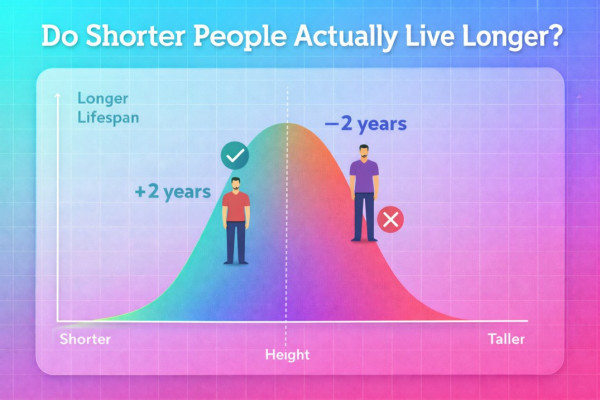Do Shorter People Actually Live Longer? The Science Explained

By Brent | Last Updated: February 17th, 2026
Do Shorter People Actually Live Longer?
Human longevity is shaped by many forces: genetics, lifestyle, environment, and increasingly, biology we are only beginning to understand. Height is one of the more controversial variables in this conversation.
Over the past several decades, multiple studies have observed that shorter individuals tend to live longer than taller individuals, on average. Importantly, these findings are correlational, not deterministic. Height does not cause shorter or longer lifespan on its own, but it may reflect deeper biological tradeoffs.
So what does the science really show?

Key Takeaways
> Multiple population studies associate shorter height with longer lifespan.
> The relationship is correlational, not causal.
> Growth pathways tied to height may influence aging and disease risk.
> Cancer risk and metabolic signaling appear to scale with body size.
> Height is only one small factor within a much larger longevity equation.
Is There a Real Link Between Height and Lifespan?
The idea that shorter people live longer has circulated for decades, but earlier evidence was inconsistent. More recent research, however, has strengthened the association across different populations and study designs.
These findings do not suggest that height determines destiny. Rather, height may act as a proxy for biological processes that influence aging. Understanding the difference between lifestyle and genetics helps put this relationship in proper context.
What Does the Research Say About Height and Lifespan?
Italian Military Cohort
One of the earliest large-scale analyses examined Italian military personnel. The study found that men shorter than approximately 161 cm (5'3") lived longer on average than taller men.
Limitations existed:
> Body mass index was not controlled
> Only men were included
> Lifestyle variables were limited
Even so, the findings helped spark further investigation.
FOXO3 Genotype and Height
Later genetic studies focused on variants associated with longevity, particularly the FOXO3 gene, a regulator within insulin and growth signaling pathways.
Researchers found:
> Shorter individuals were more likely to carry longevity-associated FOXO3 variants
> Reduced growth signaling correlated with improved lifespan outcomes
This strengthened the hypothesis that growth pathways, not height itself, may influence aging. Tools like epigenetic age tests now allow individuals to measure how these pathways affect their biological age independent of height.
Professional Basketball Players
A study of retired professional basketball players offered another perspective. The tallest players, representing the upper extreme of height, had shorter average lifespans than their shorter peers.
This suggested that extreme height may carry cumulative biological costs, particularly over decades.

Why Might Shorter People Live Longer Than Taller People?
How Does IGF-1 Influence Height and Longevity?
Height is strongly influenced by growth hormone and insulin-like growth factor 1 (IGF-1). These pathways promote:
> Rapid growth
> Increased cell division
> Higher metabolic demand
Lower IGF-1 signaling has been linked to:
> Reduced cancer risk
> Improved metabolic resilience
> Longer lifespan in animal models
In humans, reduced growth signaling appears to trade size for durability. This mechanism overlaps with caloric restriction research, where reduced nutrient signaling extends lifespan across multiple species.
Does Height Affect Cell Count and Cancer Risk?
Taller bodies contain more cells. More cells mean:
> More DNA replication
> More opportunities for mutation
This may partially explain why taller individuals have a higher risk of several cancers, independent of lifestyle factors. Understanding cellular senescence and how zombie cells accumulate adds context to why cell count matters for long-term health.
Does Height Increase Cardiovascular or Structural Load?
Larger bodies place greater mechanical and metabolic demands on:
> The heart
> Blood vessels
> Joints
Over time, this may subtly increase wear and disease risk, particularly if other health factors are suboptimal. Chronic inflammation compounds these effects, see our guide on beating inflammation for anti-aging.
How Does the FOXO3 Gene Relate to Height and Longevity?
FOXO3 plays a role in:
> Stress resistance
> DNA repair
> Cellular maintenance
Its association with both shorter stature and longer lifespan suggests that longevity favors efficiency and repair over growth and expansion.
This mirrors findings in many species, where reduced growth signaling correlates with extended lifespan. Compounds like rapamycin and metformin are being studied precisely because they modulate these same pathways.
Does This Apply to Everyone?
No.
Height interacts with:
> Sex
> Nutrition
> Socioeconomic status
> Healthcare access
> Lifestyle behaviors
In many populations, taller height correlates with better childhood nutrition and lower early-life disease risk, which can counterbalance biological tradeoffs later in life. Our guide to longevity covers how these factors interact across the lifespan.
What Does Height Mean for Your Longevity Risk?
Height is not modifiable in adulthood, but its implications are actionable.
For taller individuals:
> Focus on cancer screening
> Prioritize metabolic health
> Reduce inflammation and oxidative stress
For shorter individuals:
> Longevity advantage is modest
> Lifestyle still dominates outcomes
In both cases, behavior outweighs biology. Regular blood panel testing helps track metabolic markers regardless of height. Working with a longevity-focused physician can personalize screening based on individual risk factors.
Does Above-Average Height Increase Risk of Early Death?
At the extremes, height appears more strongly associated with risk. Very tall individuals show:
> Higher cancer incidence
> Increased cardiovascular strain
> Greater orthopedic stress
These risks are statistical, not guaranteed, but they reinforce the idea that biological scale matters.
Wrap-Up
So, do shorter people live longer?
On average, yes, but not because of height itself.
Height reflects underlying growth and metabolic pathways that influence aging, disease risk, and cellular stability. These pathways trade rapid growth and size for long-term maintenance and repair.
In the end, height nudges the odds, but lifestyle, environment, and medical care decide the outcome.
Longevity is not about stature. It's about how well your biology is maintained over time, and that's something you can actually control. For a comprehensive framework, explore why longevity matters and how to build sustainable habits.
FAQs about Height and Lifespan
Which height lives the longest?
There is no single optimal height, but shorter individuals tend to show slightly longer average lifespans.
Does height play into life expectancy?
Height correlates with life expectancy, but it does not determine it.
Do shorter people live longer than taller people?
On average, yes, though the effect is modest compared to lifestyle factors.
Why might height be linked to lifespan?
Growth signaling, cancer risk, and metabolic demand scale with body size. The FOXO3 gene appears to mediate this relationship.
What is IGF-1, and how does it relate to height and aging?
IGF-1 promotes growth but may accelerate aging when chronically elevated. Lower IGF-1 signaling is associated with longer lifespan in multiple species.
Can tall people offset this effect?
Yes. Lifestyle, screening, and metabolic health matter far more than height. Longevity supplements and dietary strategies can support cellular health regardless of stature.
What is the optimal height for longevity?
There is no optimal height, only optimal biology and behavior.
About the Author
Sign Up For Our Newsletter
Weekly insights into the future of longevity
